In the first part of our lengthy interview with Alex Rigopulos, Eran Egozy, and Greg LoPiccolo of Harmonix Music Systems, we talked about the past and future of Rock Band, the company's new-found independence, and the years of competition with Activision. In today's second and final portion of the interview, we talk about the success of Dance Central, the joys and challenges of working with Kinect, and the future directions of the music genre itself.
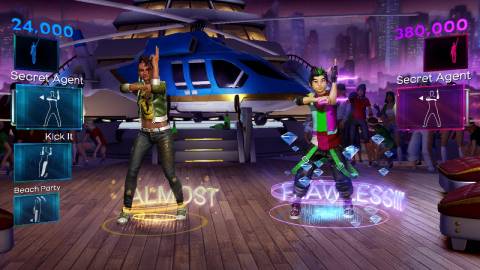
Giant Bomb: Looking at how Dance Central came about, Harmonix was one of the first studios to embrace Kinect at the start, back when Microsoft was trying to drum up developer support for the device. What was it about Kinect that was so definitively interesting to you?
Eran Egozy: We still are pinching ourselves a little bit at the sheer fortune of coincidence of how this worked out. We already had a dance game in the works before Microsoft came to us with the technology, and that wasn't a stepping game in the sense that like a Dance Dance Revolution was.
GB: What tech were you using?
EE: We were going to use sensing tech of some kind. We were talking to different third parties and looking at options. We had the sense that motion-sensing tech was starting to come down to a price that consumers could stomach, and, actually, most people don't know this, but there are a number of other technology players who have various types of motion-sensing technologies, and we were working with some of these folks, trying to figure out how to do a dance game that involved more than just stepping on four buttons, or waving your hand around. We were looking at tracking much more of your body than that. But still, while these technologies were cool, they weren't wholly embraced by first parties. So when we saw Kinect, we were blown away by this thing. Because honestly, you could not picture a more perfect technology to work with this game that we were already part of the way through developing, so all we really had to do was swap detection technologies and we were off.
GB: In a sense, you had a head start without even trying for it.
EE: We had a head start, and we didn't really realize how fortuitous it would become. They had spent years and years developing this thing, and they were fully supporting it. They were shipping the hardware, not us. We know a lot about shipping hardware, and it's hard.
It's really difficult to get hardware right. Microsoft was clearly able to do this, so again, it was almost like this pre-ordained match made in Heaven for us. And I think both parties could see the potential. We were like, "Oh god, this is amazing," and they were like, "Okay, this is it." We both worked really hard on getting it done. It was a fantastic collaboration, working with them day in and day out.
GB: By the same token, some developers have periodically grumbled about working with the tech, and I think some of that frustration has shown in some of the less-stellar software that's popped up on Kinect since it launched. And yet Dance Central has always struck as this weird beacon, this prime example of how to use the tech efficiently, both in terms of gameplay and UI. Is there something you guys understand that maybe other developers haven't quite figured out yet?
Alex Rigopulos: First of all, I think the specific concept we went after in the first Dance Central is just a powerful idea. Dancing is just one of these primal human desires. It was a no-brainer app, and beyond that, it was just about high quality execution of the idea. At the same time I think there are some general principals you have to bear in mind. The Kinect, like any new technology, is good at some things, and not so good at other things. As a game developer, you have to design a game that plays to that technology's strengths, and avoids its pitfalls. I think that one of the areas we were successful in with Dance Central is that we played to the device's strengths, and hid the shortcomings of the device under the hood in a way that some other games perhaps didn't.
EE: We're not getting any technical advantage over anyone else. We use the same standard APIs as everyone else. We looked at this thing, and I think we just made some good choices up front about how to use the tech in a way that sort of highlights the best parts of it, and kind of hides the parts that are not so great. It's totally true, though. It's not a complete walk in the park to use this thing. It SHOULD feel completely awesome and magical when you're playing it. But in order to achieve that, there's a lot of under-the-hood monkey business that has to go on, because honestly, the thing isn't perfect.
If Kinect was going to cost $1,000, I bet they could have a bunch of tech in there to make it a more perfect realization, but in the end, you have to make these compromises to make the technology affordable. They had to find the right sweet spot between price point and technology. As a developer, you're essentially stuck in this situation where you have to make the right kind of compromises, the right kind of design choices, and the right kind of technology choices to find that sweet spot.
And I think that's something we're particularly good at doing here at Harmonix. Like, for instance, with EyeToy: Anti-Grav, we had to create this, like, crazy game, out of technology that can barely handle it. It's like, "screw it, we're going for it!"
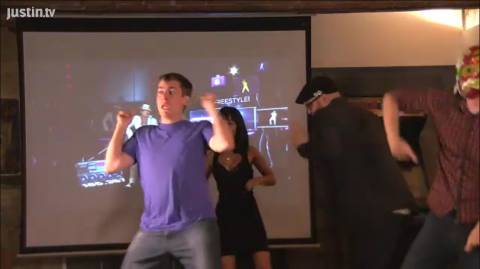
GB: Are there any meaningful changes you, as a Kinect developer, believe Microsoft can enact with the technology as it currently exists? Or is Kinect pretty much what Kinect is going to be until the next hardware iteration?
EE: I think there's still plenty they could do if they chose to. One thing they've been focused on a lot recently is voice navigation. Their voice recognition system actually works quite well, and you'll see that in Dance Central 2, how we've implemented that technology. It's pretty cool, and I imagine that a lot more games will start using that. But in terms of the camera tech, the skeleton detection stuff, they provide a set of tools that help you develop algorithms for how to do that stuff. I think they've been wanting to not dictate too much how it should be done, because I think they want developers not to feel too constrained, and come up with new stuff that maybe they haven't thought of before.
So they provide you a set of tools that help you test and record data and do all these different things, but I think that on the API side, they could maybe provide more on the API side with the gesture detection elements. What you get from them is fairly raw, you get a skeleton, but then it ends up occasionally failing in certain ways. And that's okay, because they want you, the developer, to figure out the best way to deal with those situations. But I also think they could provide some kind of higher level API that gives people more of a head start if they want to do more standardized things.
GB: Dance Central has obviously been a huge boon for you guys, especially given the timing of its success in relation to the downturn with Rock Band. Where do you see the franchise going from here? Is Dance Central something that can be meaningfully innovated upon?
AR: I think that there are some pretty ambitious things we'd like to do with Dance Central. Often when you get to number two in a series release, you get to put in you sort of wish you could have been able to put in the first game, and also have learned some lessons from that first title. You get to polish off some of the burrs, and add in some of the bells and whistles that you really wish had been there the first time. In that sense, version two often tends to feel like the first version that feels fully realized. I think that's the case with Dance Central 2. It's a much more fully-realized version of the experience.
That said, I think that there are some pretty significant, ambitious new aspects to the experience that were beyond the scope of what we could hope to put into this release that I still hope that we have the opportunity to go after in the future. I think there's plenty of room for growth. There's certain bedrock that is unlikely to evolve much.
GB: So, presumably, it will still be a dance game, then.
AR: Exactly. But there is room in the scope and scale of the title we hope to explore.
GB: Have you spent much time with the PlayStation Move? I know Sony has their own, barely-acknowledged dance game, but I'm curious if you have any ideas or plans for Move in the future.
EE: We're interested in all kinds of motion-based gaming at this point. We're expanding our view pretty wide, both with Sony's Move, and with the Wii U, which is terribly exciting to me.
GB: Have you had a chance to look much at the Wii U yet?
EE: Not yet, no. There, you also have this tablet thing, and that has all kinds of gameplay potential. I think we're pretty much assuming that everyone who has a Wii U will have a Wii Motion plus equivalent, which means that the detection technology there is much better. It's nice, because you're potentially starting at a technology base that's much higher, which means that you can craft better gameplay.
The PS Move is super accurate, so it lends itself to a different kind of gameplay than perhaps what you can do with Kinect. You can do some of the same things with both, but each has their own strengths and weaknesses. So I think you can tailor gameplay toward either device to best take advantage of those systems.
GB: This is perhaps an overly broad question, so I'll try and specify it a bit. Alex, you recently wrote the foreword for Scott Steinberg's recent online book about music games, Music Games Rock, didn't you?
AR: Yes I did.
GB: Say what you will about that book, but the one thing it does highlight very well is how remarkably broad the music genre is in games. It's not just plastic instruments and dancing, it's also stuff like Frequency/Amplitude, Parappa the Rapper, Vib-Ribbon, Groove Coaster, and whatever else. There are a million different subgenres, and the industry seems to ebb and flow between these different ideas of what consumers want from a music game. Given that the plastic instrument genre has receded some, and dancing seems to be at its peak right now, where do you see the music genre heading from here?
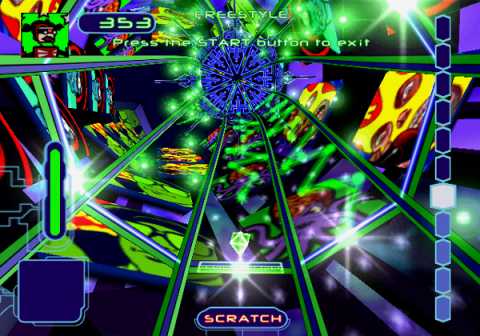
AR: That question is the question that senior designers and other creative principals spend all day every day debating and asking ourselves...
GB: Well, then I guess my question would be, what is your debate point in those meetings?
AR: I think we're successful when we create a gameplay experience that in some meaningful way amplifies the emotional connection people have to music. There's already this infinite pool of emotional content that's wrapped up in the music itself, and if through interaction with the music you can amplify that emotional content, that's when you have something special. For us, simulation of performance of that music is one way of going about it, dancing to the music is another way. The creative exploration is about what other kinds of interaction of that music can we do? One obvious option is interactive manipulation of that music. It's something that hasn't really been touched in our previous games, one that's rife for creative potential. There are others, too. Needless to say, a lot of our prototyping and creative development is directed at exploring that terrain.
GLP: I think in a way it's not for us to speculate. I think the thing that would concern me on the development side is, "Do we have ideas?" The answer is "We do." There's some stuff that I think, should it ever be announced and come to pass, would absolutely would lend itself to innovation.
GB: Understandable. I think I'm just more curious where the heads of a studio so ensconced in this genre would like to see it go.
GLP: High level? For me, the next great frontier to cross would be creating music. We've put a lot of effort into that, and it's a hard design problem. It's hard to do that in a way that makes for an accessible game experience. That's personally exciting to me, and I think doable. We'll see what, if anything, pops out in the next couple of years!
EE: I guess what I'll say is that the thing we're interested in on the music side is coming up with new ways for people to experience music and interact with music. Music has such a strong emotional connection to us, you know? People might think, "Well, they've done Rock Band, and they've done dancing. What else is there?" We think there is quite a lot more, it's not like these are the only two spaces to work within, and then we're done. We're continuing to think of new ways for people to interact with and experience music because it's such an emotionally powerful avenue.
GB: One of the things I've found most recently intriguing about Harmonix is the sudden burst of random, independent creativity from the team. VidRhythm seems like a perfect example of that, plus the PXL PUSHR project Harmonix staffers Matt Boch and Ryan Challinor put together on their own time. It seems like now that you're free of Viacom, people have taken this attitude of, "Screw it, let's just try this and see if it works."
AR: Sounds like the green light meeting such as it was for VidRhythm (laughs). That's actually part of the beauty of the iOS world, or even mobile games compared to the console world. When you're spending $10 or $15 million to make a game, you need to be pretty confident that you've got something there. If you're spending like $300,000 on a game, you can afford to take a lot of creative bets in response to creative impulses.
GB: It's something you're starting to see studios do more and more. PopCap with their 4th and Battery label, for instance.
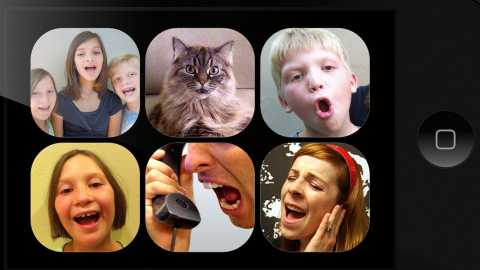
AR: It's funny. One of the ways in which we need to evolve as a studio now is to develop organizational methodologies to accomodate exactly that. For our whole history, we've been a console studio making multi-million dollar projects. And we have very well-developed methodologies to do that. But now, we're just now starting to become a studio that also accomidates this sort of rogue, lower-budget, shorter timeframe development. And to be perfectly honest, we're at the front edge of developing organizational processes to do that well, and I think we'll learn a lot of lessons very quickly.
In the last year we've moved to scrum methodology, which is this kind of controlled chaos, even within $10 million dollar console projects, there is this kind of rogue independence that happens within those large projects that is actually applicable to some of these smaller projects. Thankfully, we have already learned some lessons in transition to the scrum methodology that are bearing fruit in this new realm as well.
GLP: During the RB/GH days, we didn't have a lot of bandwidth to do other stuff, because it was just so much work to keep those franchises fed. As everyone knows, the world of gaming is changing. It's fragmenting, there are a lot of indie stuff, there are new platforms that are getting a lot of traction, so I think we're evolving our response to all of that, and I think we're excited about trying new things.
There's certainly a ton of creative energy at this company, there is a lot of people with a lot of ideas. I think we're excited to be able to support as much of that we can. Ideally we can do it in a way that's profitable--and that can be a challenge. But you know, VidRhythm's cool, it's been a blast to work on it, and it's been a blast to see what people have done with it.
GB: What do you dig more? Producing the big console stuff? Or working on the smaller projects?
AR: I love both. The beauty of the big console projects is that they're an opportunity to build these huge, deep, grandiose, immersive, highly-emotionally impactful experiences that you just can't do on a phone, you know? The flipside is that you can just have a cool idea, and then go build it and put it in the world three months later on a phone. Not an easy thing to do in the console business. So I think that as a creative person, both those avenues have very different draws to them.
GB: It seems like Harmonix's focus will always be on music games, but is there room for you guys to make something outside of the music genre at this stage of the company's existence?
GLP: Our primary focus is music games, one because it's our skillset, and we also think that there's a ton of unexplored territory. There's lots of new stuff you can make, we don't think that well is dry. We also don't think people are going to be bored of music any time soon.
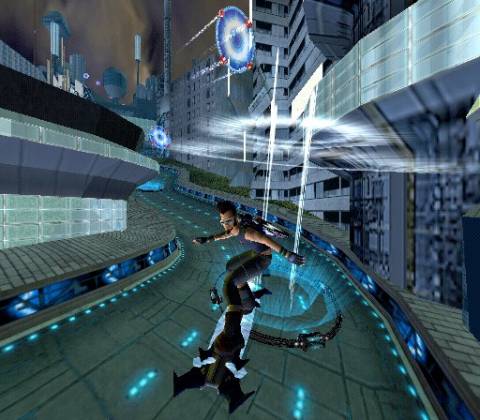
AR: It has always been the case and probably always will be the case that, at our core, we are a music-focused studio. At the same time, I think we try to be open-minded about compelling opportunities. For example, right now, given our experience with Dance Central, we've been really motivated by the creative opportunities afforded by Kinect. So I think we would be open-minded about motion gaming opportunities for Kinect, or even other motion control platforms that weren't necessarily music-focused; IF we struck upon the right idea. Our DNA is very much music-focused, but I would never say never about doing something outside of the music domain.
GLP: It's one of those things that people will always be interested in. If we have another creative opportunity that goes in another direction, then I think we're open to it, we're not doctrinaire about it, but I think most of the key creative folks here are still excited about the possibilities of music gaming, and excited about pursuing other aspects we haven't had the chance to in the past.
GB: Finally, and I'm well aware that you can't necessarily divulge anything too specific, what's next for you guys?
AR: We've got a great DLC release schedule for this holiday, both for Rock Band and Dance Central. I'd actually say that our first REAL push for Dance Central DLC is coming this holiday. We're gonna have tons of stuff to talk about next year, but for the rest of this year, it's all about Dance Central 2 and Rock Band DLC.
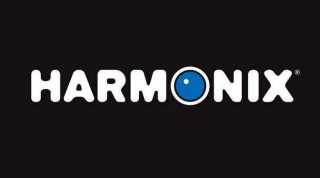
Log in to comment